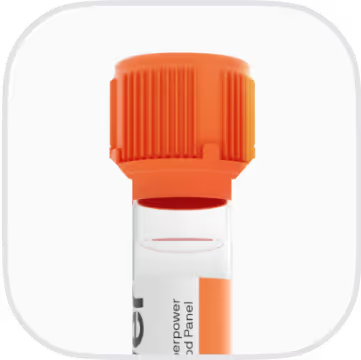What are Hypothyroidism biomarkers
Hypothyroidism biomarkers are blood signals that map the thyroid’s hormone supply and its master control, letting us see how well the body can keep its metabolic pace. The pituitary’s messenger, thyroid-stimulating hormone (TSH), reflects how loudly the brain is asking the thyroid to work. The thyroid’s main output, free thyroxine (free T4), shows how much hormone is actually available to tissues, while free triiodothyronine (free T3) represents the active form that cells use after conversion from T4. Autoimmune flags—thyroid peroxidase antibodies (TPO antibodies) and thyroglobulin antibodies (Tg antibodies)—reveal whether the immune system is targeting the gland, the most common root of underactivity. Read together, these markers locate the weak link in the feedback loop (thyroid versus pituitary), show current hormone availability, and uncover immune pressure on the gland. Testing matters because thyroid hormones set the baseline for energy, temperature regulation, heart rhythm, mood, and lipid handling; precise biomarker tracking allows early detection of underactive function, clearer diagnosis of cause, and tailored dosing when hormone replacement is needed.
Why is blood testing for Hypothyroidism important?
- Check if your thyroid is underactive and needs treatment.
- Spot hormone imbalance: high TSH with low free T4 index, total T4, and T3 uptake.
- Clarify fatigue, weight gain, dry skin, hair loss, constipation, and feeling cold.
- Guide treatment by using TSH to adjust levothyroxine until levels normalize.
- Flag an autoimmune cause when TPO or thyroglobulin antibodies are positive.
- Protect fertility and pregnancy; treatment lowers miscarriage, preterm birth, and developmental risks.
- Reduce long-term risks by treating cholesterol elevations, heart strain, and cognitive fog.
- Track progress by rechecking TSH 6–8 weeks after changes, then at steady intervals.
What insights will I get?
Hypothyroidism blood testing provides a window into how well your thyroid gland supports the body’s energy production, metabolism, cardiovascular function, brain health, reproductive system, and immune balance. The thyroid acts as a metabolic control center, and when it underperforms, nearly every system can be affected. At Superpower, we assess hypothyroidism using these biomarkers: TSH (Thyroid Stimulating Hormone), Free T4 Index, Total T4, T3 Uptake, TPO Antibodies (TPO Ab), and Thyroglobulin Antibodies (Tg Ab).
TSH is a hormone from the pituitary gland that signals the thyroid to produce hormones. In hypothyroidism, TSH levels rise (↑) as the body tries to stimulate a sluggish thyroid. Free T4 Index and Total T4 measure the main hormone produced by the thyroid; both decrease (↓) when the gland is underactive. T3 Uptake reflects how much thyroid hormone is available to tissues and also tends to decrease (↓) in hypothyroidism. TPO Ab and Tg Ab are antibodies that, when elevated, indicate the immune system is attacking the thyroid, a common cause of hypothyroidism known as autoimmune thyroiditis.
When TSH is high and thyroid hormones are low, it signals that the body’s energy regulation is compromised. This can lead to symptoms like fatigue, weight changes, slowed thinking, and changes in heart and reproductive health. The presence of thyroid antibodies points to immune system involvement, which can affect the stability and long-term function of the thyroid gland.
Interpretation of these results can be influenced by factors such as pregnancy, age, acute illness, certain medications, and differences in laboratory methods. These variables are important to consider for an accurate understanding of thyroid health.







.avif)



.svg)





.svg)


.svg)


.svg)

.avif)
.svg)










.avif)
.avif)
.avif)


.avif)
.avif)




.svg)




.avif)


